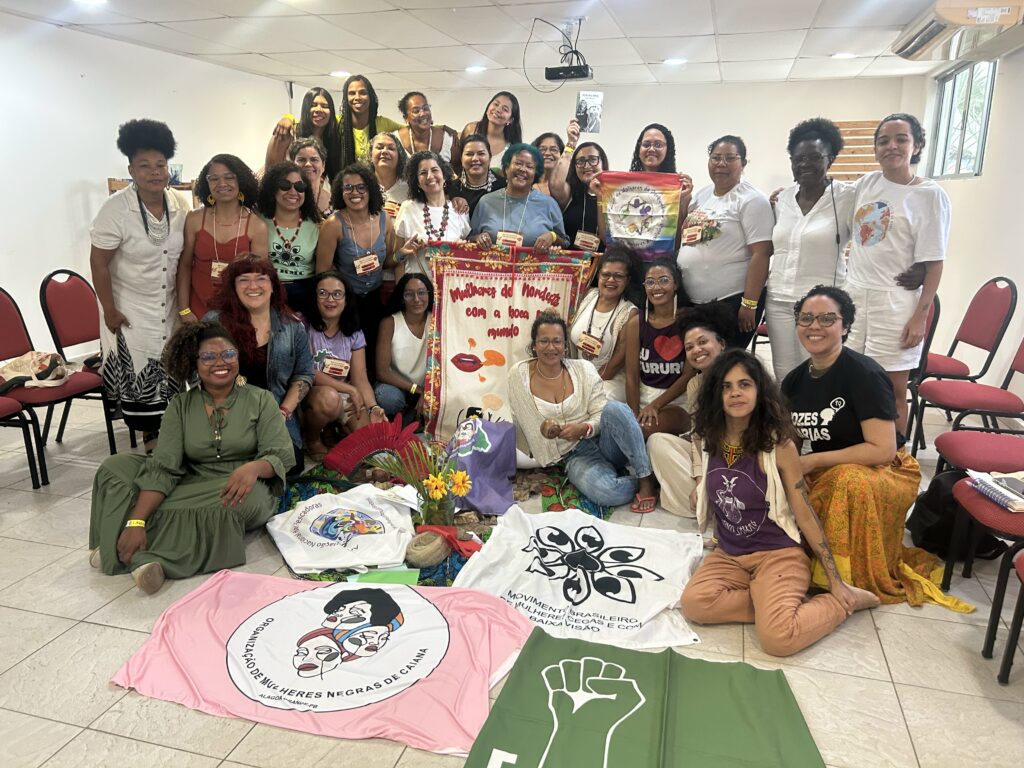
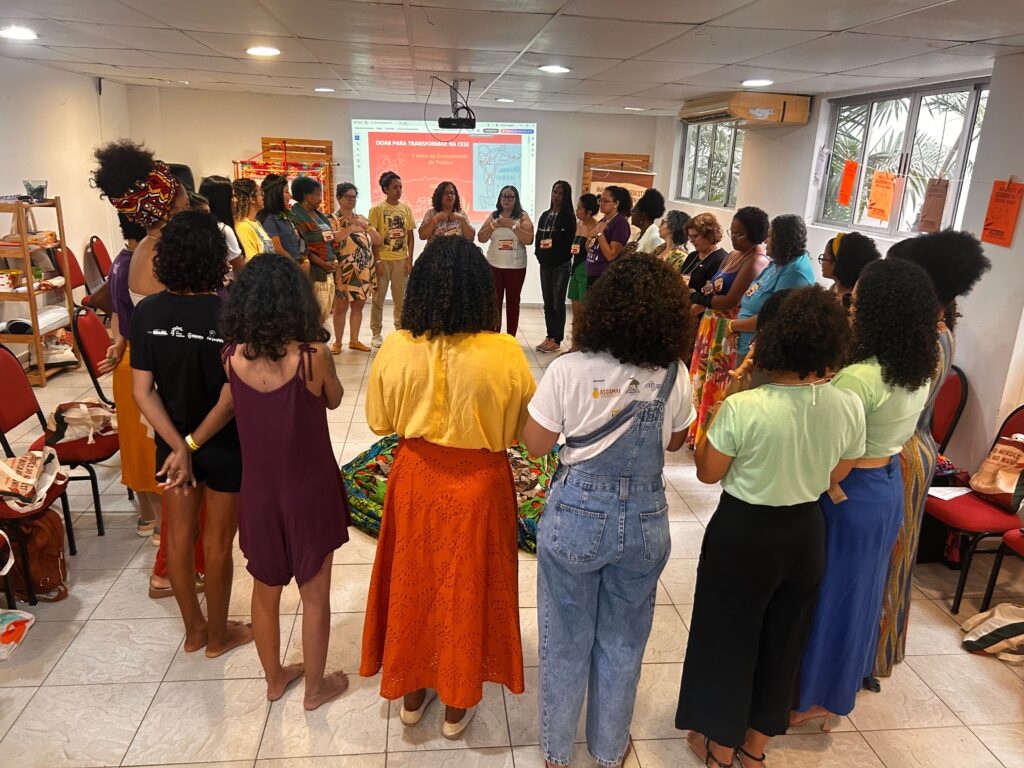
From 20 to 22 August, Recife (Pernambuco) was the stage of a powerful meeting that brought together feminist leaders, grassroots communicators, militants and activists from nine states in the Northeast. The workshop, Women from the Northeast Com a Boca no Mundo (Telling the World) – Communications and Struggles for Rights, was hosted by the CESE Giving for Change programme and provided an arena for learning, exchange and to strengthen communications as a strategy for resistance as well as to mobilize political support. Over three days, women from several territories shared stories, reflected on the challenges to the democratization of communications and tested out new languages and tools – from the radio to social media, from ancestral memories to digital technology.
From the outset, facilitators Carmem Silva, Fran Ribeiro and Lara Buitron, from SOS Corpo – Feminist Institute for Democracy (SOS Corpo – Instituto Feminista para a Democracia), noted that communicating is much more than the transmission of information: it is resistance, normalising the struggles and ensuring that historically silenced voices, such as those of women, ring out. For Vanessa Pugliese, CESE’s Projects and Training Advisor, this is a central pillar of the work: “CESE understands that training in communications is fundamental for the defence of the rights of women’s organizations in the Northeast. The Giving for Change programme connects mobilizing political support, mobilizing local resources and communications in order to strengthen the practices and potential of women’s organizations from the nine states of the Northeast.” The meeting involved the Community of Practice, an initiative which, over the last five years, has connected 25 organizations from the region, promoting exchange and supporting the construction of collective strategies. Over this time, materials such as booklets, videos, podcasts and publications, have been produced underlining the importance of the struggle for social justice and gender.
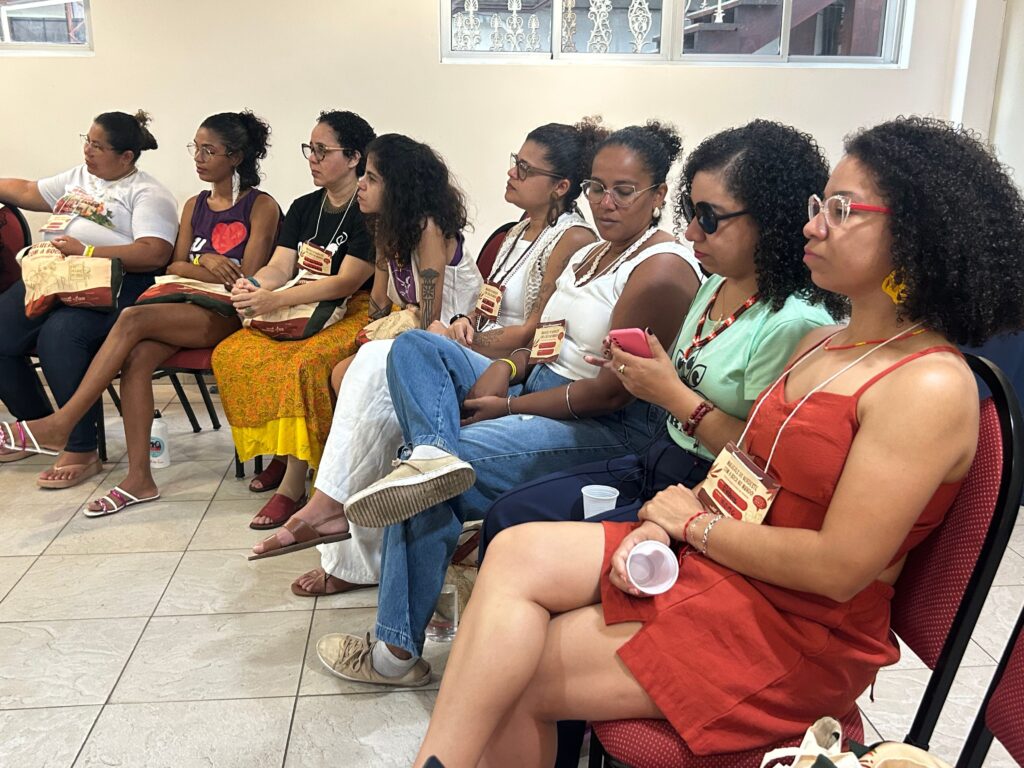
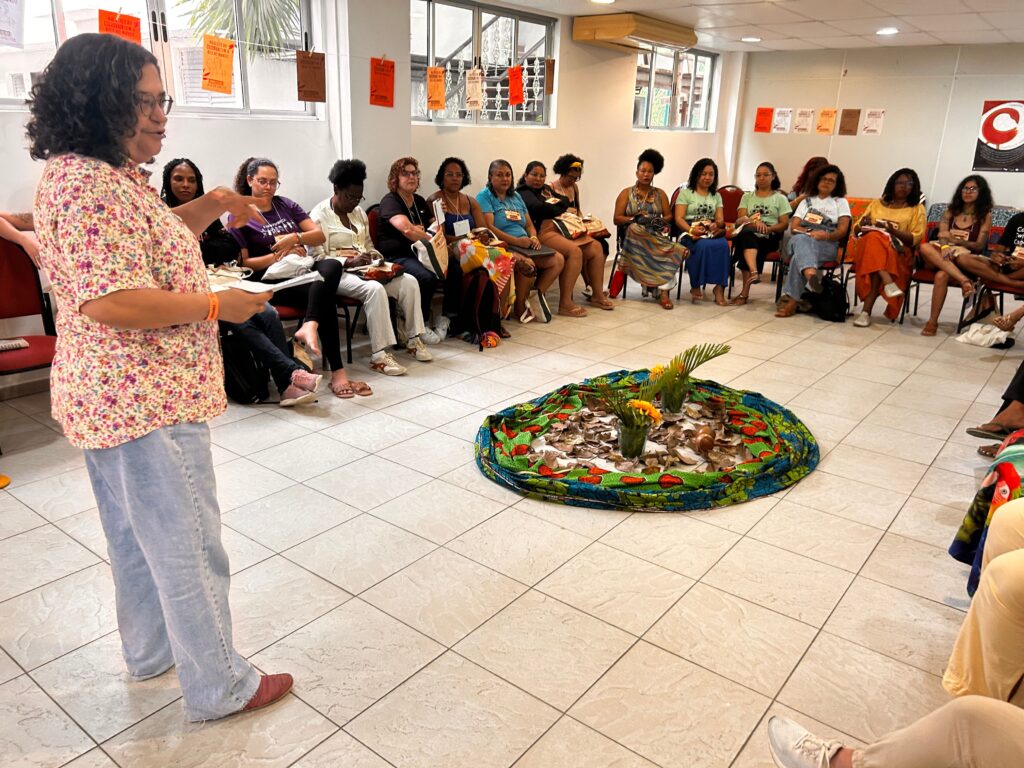
A direct phrase kicked off the course: “To communicate is to make commonplace.” In the morning, the participants reviewed the Community of Practice’s trajectory and shared communications products from their territories. The room was bursting with colours, posters, videos and publications that demonstrated the creativity and diversity of the struggles of Northeastern women. Dialogue was evidence of how challenges are repeated in the various organizations. “The workshop has been very helpful, because all the content is very up-to-date and allowed us to really connect with the world and with each other as a network, as collectives. What I think is a communications challenge for the movement as a whole involves thinking about the whole, in fact. For us, as a social movement for blind women, achieving visibility for our agenda is also a challenge,” said Denise Santos, from the Brazilian Movement of Blind and Low Vision Women (Movimento Brasileiro de Mulheres Cegas e com Baixa Visão: MBMC). Reflections on the day also focused on understanding how the patriarchy, capitalism and racism have structured communications, both within and outside the digital world. This was an invitation to consider collective strategies that can burst bubbles and democratize access to the narratives produced by these women.
The second day involved a deep dive into practices. This included radio and podcast workshops, run by Lara Buildtron (SOS Corpo), who recalled that the radio has long been a tool for the grassroots struggle. Inspiring examples were shared, such as the women’s programme on Radio Frei Caneca FM, in Recife. This was followed by a workshop about social media and digital care, facilitated by Fran Ribeiro (SOS Corpo). The debate raised issues that reflect the daily experiences of the movements: what to communicate, who to, what language to use and, above all, how to protect oneself from the exploitative logic of the large platforms. One of the key learning points was summarized in a powerful phrase: “You can’t think about communications without taking care of our mental health and considering protection.” The participants collectively created social communications technologies based on their narratives, a combination of creativity, digital security strategies and self-care.
Thais Vital dos Santos, from the Network of Black Women from the Northeast (Rede de Mulheres Negras do Nordeste: RMNN), noted one impact: “The three days were fantastic, intense, but there’s something I’d like to highlight, which was the workshops. When I think about the training in radio and podcasts, it was a moment that revealed a lot of insights, so many ideas to take to the RMNN communications sector, like doing a podcast, for example. And the second workshop, as well as being remarkable, was also extremely necessary, because if we don’t know about technology, we can’t use it to our advantage, still less confront it.”
The last day was dedicated to collective memories and the construction of possible futures. The women reflected on the importance of preserving their stories, not only as memories, but also as seeds that germinate transformations. Sharing was filled with emotion and certainty: when they talk about their own trajectories, the women are asserting their existence, identity and resistance. Edcleide da Rocha Silva, from the Movement of Peasant Women from Alagoas (Movimento de Mulheres Camponesas de Alagoas: MMCA) summarised the spirit of the workshop thus: “We have gathered here to put grassroots communications, accessibility and collective struggles onto the agenda. Although we need to be in these networks on the internet, they have not yet encompassed or welcomed everyone. Communications are being rebuilt based on the people’s social technologies, out of the voices of women, and the race and class struggles.”
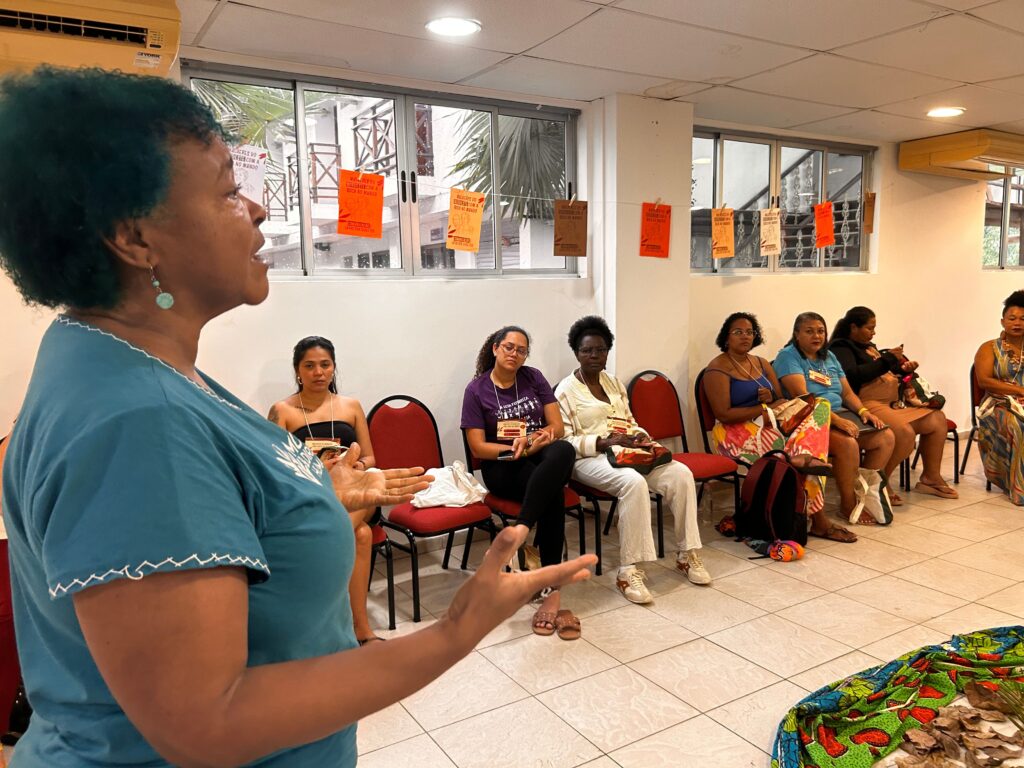
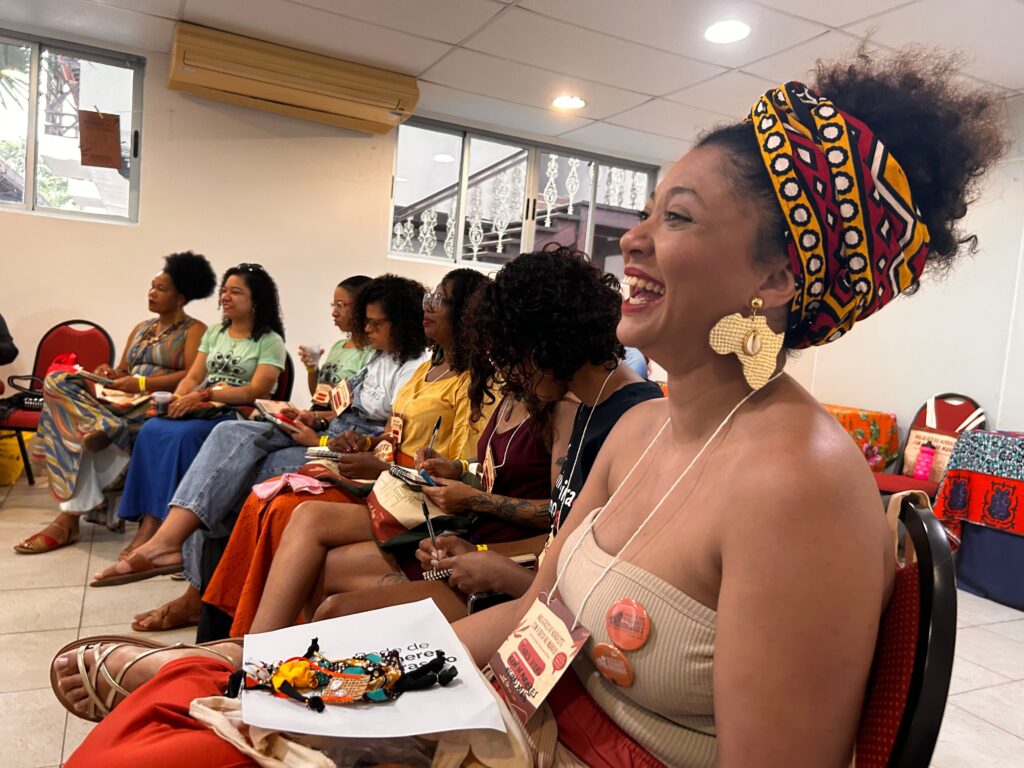
Maria Raimunda da Silva Oliveira, from the Collective of Women, Public Policies and Society (Coletivo Mulheres, Políticas Públicas e Sociedade: MUPPS) in Bahia, added: “The challenge from now on is to go back to our collectives, take all this information and share it with the women there, with everyone who is waiting to see the results. We also need to examine the climate issue and make that connection.” For Leandra Arruda, from the Tururu Force (Força Tururu) youth collective of Pernambuco, the meeting was inspiring: “It’s important to keep rethinking these new forms of communications, of social technology. Sometimes we feel paralyzed, afraid, we don’t know what to do, but it’s important to carry on reinventing and to understand that the internet isn’t a lawless land. It’s important to be present on social media, to think about digital security, digital care, more carefully and to take all this to our community as tools, as guerrilla strategies.”
Over the three days, the Women from the Northeast Com a Boca no Mundo workshop constituted an exercise in collective power, where every voice and every story gained strength from being shared. Meetings of generations, territories and different trajectories united in the certainty that communications are key to the defence of rights and for social transformation. From memories of community radio to digital guerrilla strategies, from ancestral memories to new technologies, the training demonstrated that to communicate is to resist, but also to care, protect and sow the seeds of the future.
The Giving for Change Programme is a five-year CESE initiative (2021-2025), funded by the Dutch agency Wilde Ganzen, through the Netherlands’ Ministry of Foreign Affairs. At CESE, the programme strengthens civil society organizations, particularly Northeast women’s movements, helping to build their capacity in mobilizing political support, communications and resource mobilization.

